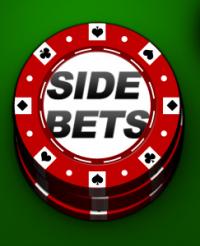 Poker is, by its nature, a slow game. That’s absolutely a feature and not a bug, but it means there’s a lot of downtime in just about every game of poker. The number of ways poker players find to fill that downtime is as varied as the types of people who play the game. Some people play every hand because they can’t stand to be in the action. For everyone else, there’s always side betting. Spend any kind of time in a poker room at all and you’re almost sure to be offered some sort of a side bet by one of your fellow players.
Poker is, by its nature, a slow game. That’s absolutely a feature and not a bug, but it means there’s a lot of downtime in just about every game of poker. The number of ways poker players find to fill that downtime is as varied as the types of people who play the game. Some people play every hand because they can’t stand to be in the action. For everyone else, there’s always side betting. Spend any kind of time in a poker room at all and you’re almost sure to be offered some sort of a side bet by one of your fellow players.
Some side bets are essentially derivatives of the actual game of poker that the betting players are participating in. One common and popular side bet is whether the flop will come all red or all black. You could also bet on whether the flop will be all face cards, or all low cards. And instead of making any of these bets on the composition of the flop, you could make them on the value of the turn or river cards. Just like with derivatives in finance, the number of different possible side bets from a hand of poker is only limited by the players’ imaginations and willingness to agree on the terms of the bet. The one major difference is a derivative side bet on a hand of poker isn’t likely to cause a chain-reaction crash of the world economy.
If you trade a percentage of your action for a percentage of another player’s action, you’re swapping. Swapping is popular among tournament players, in particular those who travel the circuit. Thanks to the variance of tournament poker, it’s not uncommon for traveling pros to hit long losing streaks; swapping 10 percent with a friend who makes his big breakthrough for a million-dollar payday can help to offset some of that. And for those who are superstitious – not that any poker player has ever been superstitious – regularly swapping action can serve as a way of appeasing the poker gods.
If the regular stakes of your game aren’t enough to keep you interested but there’s nothing higher available, consider crossbooking. Crossbooking essentially ups the stakes of the game for them without affecting anyone else at the table; when you crossbook, you’re agreeing that the loser of the bet will match a percentage of the other player’s winnings. So if you crossbooked 100 percent with your friend Fred in a cash game and you won $1,000 more than he did, Fred would have to pay you another $1,000. Crossbooking is also common in tournaments and is one way to keep them interesting for pro players who are used to playing high-stakes cash games. (Otherwise they’d be thinking about the EV they’re losing by being away from the cash tables and find it hard to stay motivated.)
There’s no time when the potential for side bets is greater than the WSOP. Not only are all the world’s poker players gathered in one spot playing the game around the clock for 7 weeks, but there are giant plasma-screen televisions all over the place where players can wager endlessly on summertime sports. In the summer of 2008 an up-and-down Tiger Woods won the US Open in a sudden-death playoff against the workmanlike Rocco Mediate, and half the players in the room paid more attention to what was going down at Torrey Pines than to the cards dealt at their tables. That same year, the Los Angeles Lakers played the Boston Celtics in the NBA Finals while Phil Ivey and Doyle Brunson were sweating millions of dollars of action on the seven-game series. And of course every four years soccer’s World Cup comes around, and the growing international contingent in Vegas is follows every moment with great anticipation.
The best thing about side bets between players is one of the same things that makes poker so great: the players set their own odds. If your buddy in seat four wants too high a price on a bet that the next flop will be all face cards, you can negotiate with him. Don’t you think that’s a great feature? Try negotiating that with the sportsbook over whether the Cowboys score first or the blackjack dealer over whether he’ll hit 21 with three sevens and see how far you get. There aren’t very many places in the world where the average person gets to set his own price for things, but side betting is one of the last refuges.
